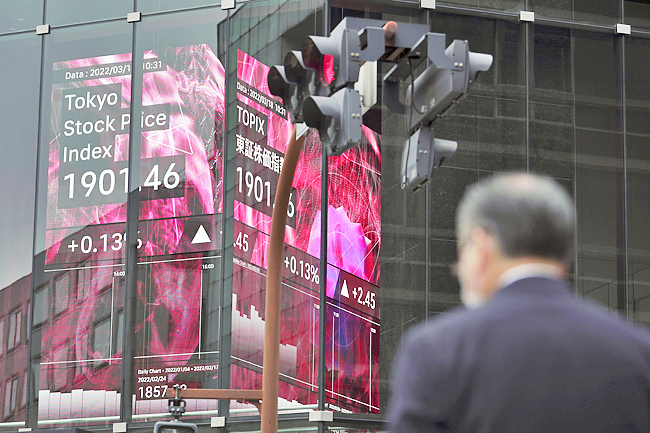BANGKOK (AP) – Shares have opened lower in Europe after gains for most Asian benchmarks as oil prices hovered above USD100 per barrel.
Stocks rose in Tokyo and Shanghai but fell in Paris, Frankfurt and London. United States (US) futures were lower.
Ukrainian President Volodymyr Zelenskyy called for more help for his country after days of bombardment of civilian sites in multiple cities over the past few days.
The war, and plans for President Joe Biden to speak with Chinese President Xi Jinping were among the uncertainties overhanging markets.
The White House said the conversation will centre on “managing the competition between our two countries as well as Russia’s war against Ukraine and other issues of mutual concern.”
Germany’s DAX slipped 0.3 per cent to 14,357.48 and the CAC 40 in Paris lost 0.5 per cent to 6,583.42. Britain’s FTSE 100 lost 0.2 per cent to 7,368.02. The futures for the S&P 500 and Dow industrials were 0.4 per cent lower.
Wrapping up a two-day meeting, the Bank of Japan opted to keep its monetary policy unchanged, with its benchmark interest rate at minus 0.1 per cent. Japan’s central bank has been keeping interest rates ultra low and pumping tens of billions of dollars into the world’s third largest economy for years, trying to spur faster growth.

Tokyo’s Nikkei 225 index rose 0.7 per cent to 26,827.43 and the S&P/ASX 200 in Sydney gained 0.6 per cent, to 7,294.40.
Hong Kong’s Hang Seng slipped 0.4 per cent to 21,412,40 after barreling higher for two days after Chinese leaders promised to provide more support for the economy and markets, suggesting Beijing might temper its crackdowns on technology and real estate companies.
The Shanghai Composite index added 1.1 per cent to 3,251.07.
On Wall Street, the S&P 500 climbed 1.2 per cent on Thursday. The Dow Jones Industrial Average added 1.2 per cent and the tech-heavy Nasdaq rose 1.3 per cent. It is on pace for its biggest weekly gain in more than a year.
Smaller company stocks outpaced the broader market. The Russell 2000 index surged 1.7 per cent.
Big swings in markets have become the norm as investors struggle to handicap what will happen to the economy and the world’s already high inflation because of Russia’s invasion of Ukraine, higher interest rates from central banks around the world and renewed COVID-19 worries in various hotspots.
Wall Street’s latest gains came after the Federal Reserve raised its key interest rate on Wednesday for the first time since 2018, something Wall Street had been expecting for months.
A barrel of US crude oil gained USD1.71 to USD104.69 per barrel in electronic trading on the New York Mercantile Exchange. It jumped 8.4 per cent on Thursday to settle at USD102.98.
Brent crude, the international pricing standard, added USD1.46 to USD108.10 per barrel in London. It leaped 8.8 per cent to settle at USD106.64 per barrel the day before. Prices have been careening on doubts over both supplies of and demand for oil. After briefly topping USD130 early last week, a barrel of US crude fell to nearly USD94 a barrel on Wednesday.
But reports of a sale of Russian crude oil to India and apparent setbacks in peace talks between Ukraine and Russia have renewed concern over possible shortfalls in supplies.


